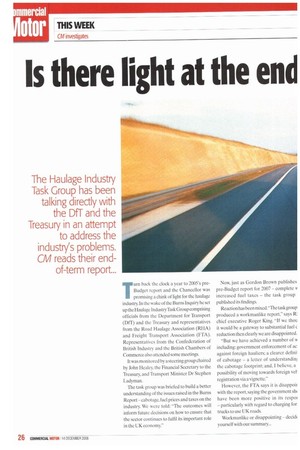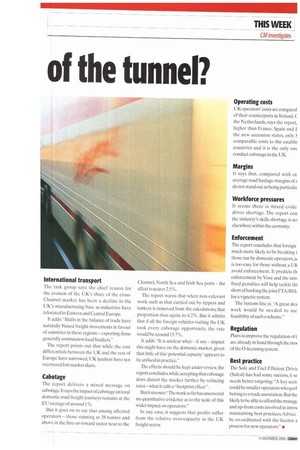Is there light at the end of the tunnel?
Page 26

Page 27

If you've noticed an error in this article please click here to report it so we can fix it.
The Haulage Industry Task Group has been talking directly with the DfT and the Treasury in an attempt to address the industry's problems.
CM reads their end of-term report._
Turn back the clock a year to 2005's preBudget report and the Chancellor was promising a chink of light for the haulage industry. In the wake of the Burns Inquiryhe set up the Haulage IndustryTask Group comprising officials from the Department for Transport (DtT) and the Treasury and representatives from the Road Haulage Association (RHA) and Freight Transport Association (FTA). Representatives from the Confederation of British Industry and the British Chambers of Commerce also attended some meetings.
It was monitored by a steering group chaired by John Healey, the Financial Secretary to the Treasury, and Transport Minister Dr Stephen Ladyman.
The task group was briefed to build a better understanding of the issues raised in the Burns Report cabotage, fuel prices and taxes on the industry. We were told: "The outcomes will inform future decisions on how to ensure that the sector continues to fulfil its important role in the UK economy." Now, just as Gordon Brown publishes pre-Budget report for 2007 complete v increased fuel taxes the task group published its findings.
Reaction has been mixed."The task group produced a workmanlike report.says RI chief executive Roger King. "If we thou it would he a gateway to substantial fuel c reduction then clearly we are disappointed.
"But we have achieved a number of IA including: government enforcement of ac. against foreign hauliers; a clearer definii of cabotage a letter of understandinl the cabotage footprint: and, I believe, a possibility of moving towards foreign vetregistration via a vignette.
However, the FTA says it is disappoit with the report, saying the government sh( have been more positive in its respoi particularly with regard to charging for trucks to use UK roads.
Workmanlike or disappointing decidi yourself with our summary...
International transport
The task group says the chief reason for the erosion of the UK's share of the crossChannel market has been a decline in the UK's manufacturing base as industries have relocated to Eastern and Central Europe.
It adds: "Shifts in the balance of trade have naturally biased freight movements in favour of countries in these regions— exporting firms generally commission local hauliers."
The report points out that while the cost differentials between the UK and the rest of Europe have narrowed. UK hauliers have not recovered lost market share.
Cabotage
The report delivers a mixed message on cabotage. It says the impact of cabotage on total domestic road freight journeys remains at the EU average of around 1%.
But it goes on to say that among affected operators — those running at 38 tonnes and above in the hire-or-reward sector near to the Channel, North Sea and Irish Sea ports — the affect is nearer 2.5%.
The report warns that when non-relevant work such as that carried out by tippers and tankers is removed from the calculations, that proportion rises again, to 4.2%. But it admits that if all the foreign vehicles visiting the UK took every cabotage opportunity, the rate would be around 15.7%.
It adds: "It is unclear what — if any — impact this might have on the domestic market, given that little of this 'potential capacity' appears to be utilised in practice."
The effects should be kept under review, the report concludes, while accepting that cabotage does distort the market further by reducing rates—what it calls a "footprint effect".
But it stresses:"The work so far has uncovered no quantitative evidence as to the scale of this wider impact on operators."
In any case, it suggests that profits suffer from the relative over-capacity in the UK freight sector.
Operating costs
U K operators' costs are comparat of their counterparts in Ireland, C the Netherlands, says the report, higher than France, Spain and I the new accession states, only comparable costs to the establi countries and it is the only one conduct cabotage in the UK.
Margins
It says that, compared with ot average road haulage margins of a do not standout as being particula
Workforce pressures
It seems there is mixed evide driver shortage. The report con the industry's skills shortage is no elsewhere within the economy.
Enforcement
The report concludes that foreign much more likely to be breaking t those run by domestic operators, at is too easy for those without a UK avoid enforcement. It predicts th enforcement by Vosa and the into fixed penalties will help tackle thi short of backing the joint FTA/R1-1/ for a vignette system.
The bottom line is: -A great dea work would he needed to asc feasibility of such a scheme."
Regulation
Plans to improve the regulation oft are already in hand through the mot of the 0-licensing system.
Best practice
The Safe and Fuel Efficient Drivii (Sated) has had some success, it se needs better targeting: "A key sect( could be smaller operators who pert belong to a trade association. But the likely to he able to afford the managt. and up-front costs involved in intro( maintaining best practices.Advice be co-ordinated with the licence a process for new operators."
















































































































































































